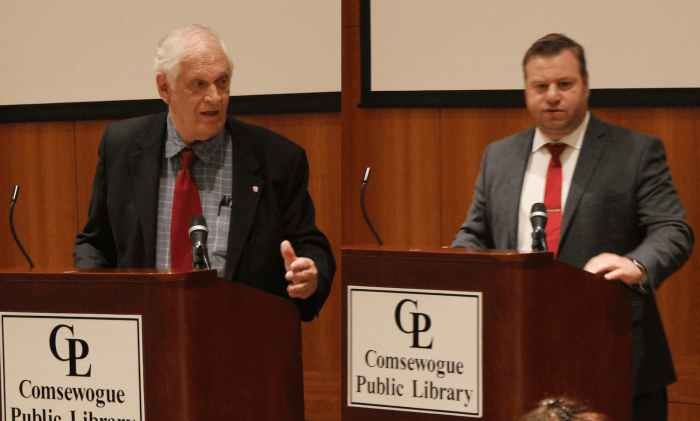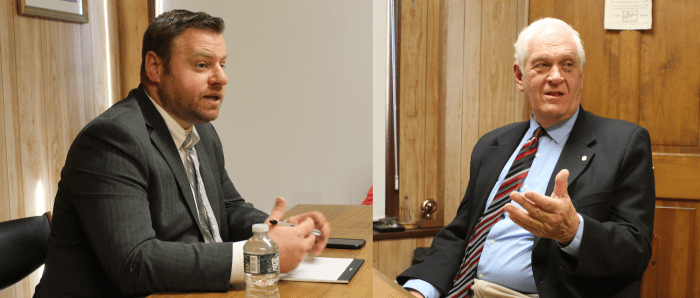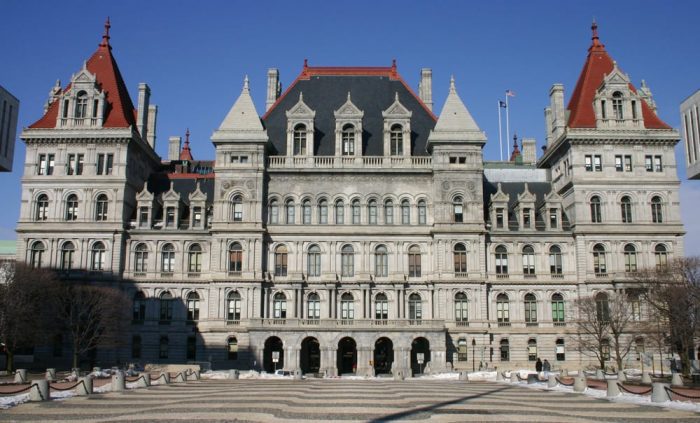In a major upset, Republican Party challenger Edward Flood, of Port Jefferson, has defeated incumbent state Assemblyman Steve Englebright (D-Setauket). Englebright, who chairs the state Assembly’s Standing Committee on Environmental Conservation, has held the seat since 1992.
Flood maintains a 700-vote lead over Englebright, with a current vote count of 24,189-23,489, according to a Suffolk County Board of Elections official. While those tallies are still uncertified, the source suggested the race is safe to call in Flood’s favor.
In a phone interview on Friday afternoon, Flood said he learned of his victory shortly after noon that day. While this result stunned many within the community, it was no surprise to his team. “On Election Day, we expected to win, and we expected to win narrowly,” he said.
While the results are still uncertified, Englebright offered his thoughts on the race during a phone interview on Sunday morning. He remarked on the several factors that contributed to his defeat, notably the effect of U.S. Rep. Lee Zeldin’s (R-NY1) gubernatorial campaign on races down the ballot.
“It appears that I have not prevailed in this election, so I am, of course, disappointed,” the assemblyman said. “The turnout was low, and the results were, in part, also because there was in this region of the state more focus on the Republican head of the ticket than there was on the Democratic one.”
Throughout the campaign, Flood focused on the issues of crime and the economy. While the assemblyman-elect attributes his win, in part, to declining trust in Albany, he credited those involved in his campaign.
“I think it was a combination of the general attitudes towards politics right now — what’s going on both statewide and nationwide, the issues that we were hitting on — and then our ground game,” he said. “We had a lot of volunteers. … Once we did some polling and realized our message was resonating, it just needed to get out.”
For Englebright, the result reflected a regional trend in this election cycle away from the Democrats. “We lost four [state] Senate seats — two of which were incumbents in Nassau County — and … it looks like we lost five [Democratic] assembly seats if you include the two in Brooklyn,” he said. “It was a disappointing evening for all Democrats, really.”
Despite his differences from the incumbent, Flood remarked on the qualities he admired in Englebright. “Assemblyman Englebright, at the end of the day, is a gentleman,” Flood said. “He was in this position for 30 years, a [county] legislator for nine. For someone to go through 39 years and never have an ethical thing come up, never have a scandal, it goes to the quality of the human being.” He added, “[Englebright] has been a champion of the environment, and that’s something I want to continue.”
Unlike his predecessor, Flood will be a minority member of the Assembly and a freshman legislator. Given these factors, Englebright encouraged Flood to find ways to be effective.
“I hope he is able to be relevant,” Englebright said. “The reality is he will be serving in the minority, and he will have a real challenge in just being able to accomplish rudimentary things.”
He added, “I hope that he’s able to be productive for the best interests of the people of the district, but all things are relative, and it’s a seniority-based system. As a freshman and minority member, it will be a challenge.”
In his interview, Flood reiterated a previous message about his intended role in Albany. While he brings some ideas and policy preferences to the office, he insists that his service requires collaboration with the communities he represents.
“I’m there to serve the people and their needs,” he said. “For a lot of people throughout the district, there are very similar needs and priorities that we want. We want good schools, safe neighborhoods, economic opportunities. We want the prices of things to come down, and we want to be able to manage to stay on Long Island.”
He concluded, “My door is always open to see what the needs of the community are and act appropriately. At the end of the day, I was elected to [advance] the needs and the work of the community, not necessarily my own needs.”
After serving in public office for nearly four decades, Englebright will soon return to life as a private citizen. However, the outgoing assemblyman pledged to stay involved in the community and remains committed to the principles and policies guiding his time in office.
“I’m in every way looking forward to continuing to make contributions to the community,” he said. “Ultimately, we are one community, and we have a need to respect our common heritage and continue to do everything possible to protect our quality of life by investing in young people and joining together to protect things that matter, such as the water quality of our harbors and drinking water,” adding, “These are things we should continue to work together on.”











